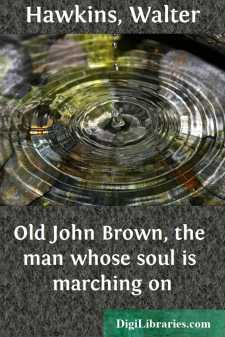Categories
- Antiques & Collectibles 13
- Architecture 36
- Art 48
- Bibles 22
- Biography & Autobiography 813
- Body, Mind & Spirit 142
- Business & Economics 28
- Children's Books 17
- Children's Fiction 14
- Computers 4
- Cooking 94
- Crafts & Hobbies 4
- Drama 346
- Education 46
- Family & Relationships 57
- Fiction 11829
- Games 19
- Gardening 17
- Health & Fitness 34
- History 1377
- House & Home 1
- Humor 147
- Juvenile Fiction 1873
- Juvenile Nonfiction 202
- Language Arts & Disciplines 88
- Law 16
- Literary Collections 686
- Literary Criticism 179
- Mathematics 13
- Medical 41
- Music 40
- Nature 179
- Non-Classifiable 1768
- Performing Arts 7
- Periodicals 1453
- Philosophy 64
- Photography 2
- Poetry 896
- Political Science 203
- Psychology 42
- Reference 154
- Religion 513
- Science 126
- Self-Help 84
- Social Science 81
- Sports & Recreation 34
- Study Aids 3
- Technology & Engineering 59
- Transportation 23
- Travel 463
- True Crime 29
Old John Brown, the man whose soul is marching on
by: Walter Hawkins
Categories:
Description:
Excerpt
CHAPTER I
There are few who have not a dim notion of John Brown as a name bound up with the stirring events of the United States in the period which preceded the Civil War and the emancipation of the slave. Many English readers, however, do not get beyond the limits of the famous couplet,
John Brown's body lies mouldering in the grave,
But his soul is marching on.
That statement is authentic in both its clauses, but it is interesting to learn what he did with the body before it commenced a dissolution which seems to have been regarded as worth recording. Carlyle says in his grimly humorous way of the gruesome elevation of the head of one of his patriotic heroes on Temple Bar, 'It didn't matter: he had quite done with it.' And we might say the same of the body which was hanged at Charlestown in 1859. In his devoutly fatalistic way John Brown had presented his body a living sacrifice to the cause of human freedom, and had at last slowly reached the settled opinion that it was worth more to the cause dead than alive. Such a soul, so masterful in its treatment of the body, was likely to march on without it. And it did in the years that followed, This Abolitionist raider, with a rashness often sublime in its devotion, precipitated the national crisis which issued in the Civil War and Emancipation.
There are lives of brave men which set us thinking for the most part of human power and skill: we watch bold initiators of some wise policy carrying their enterprise through with indomitable courage and in-exhaustible patience, and we are lost in admiration of the hero. But there are other brave lives which leave us thinking more of unseen forces which impelled them than of their own splendid qualities. They never seem masters of destiny, but its intrepid servants. They shape events while they hardly know how or why; they seem to be rather driven by fate than to be seeking fame or power. They go out like Abraham, 'not knowing whither they go,' only that, like him, they have heard a call. Sometimes they sorely tax the loyalty of their admirers with their eccentricities and their defiance of the conventions of their age. Wisdom is only justified of these, her strange children, in the next generation. Prominent among such lives is that of John Brown. The conscience of the Northern States on the question of slavery needed but some strong irritant to arouse it to vigorous action, and, the hanging of John Brown sufficed.
The institution of slavery became both ridiculous and hateful to multitudes because so good a man must be done to death to preserve it. The verdict of Victor Hugo, 'What the South slew last December was not John Brown, but slavery,' found an echo in many minds. And when the long, fierce conflict, through which Emancipation came, was begun, the quaint lines,
John Brown's body lies mouldering in the grave,
But his soul is marching on,
became one of the mightiest of the battle-songs which urged the Federal hosts to victory. His name kindled the flame of that passion for freedom which made the cause of the North triumphant, and there was awe mingled with the love they bore his memory....


